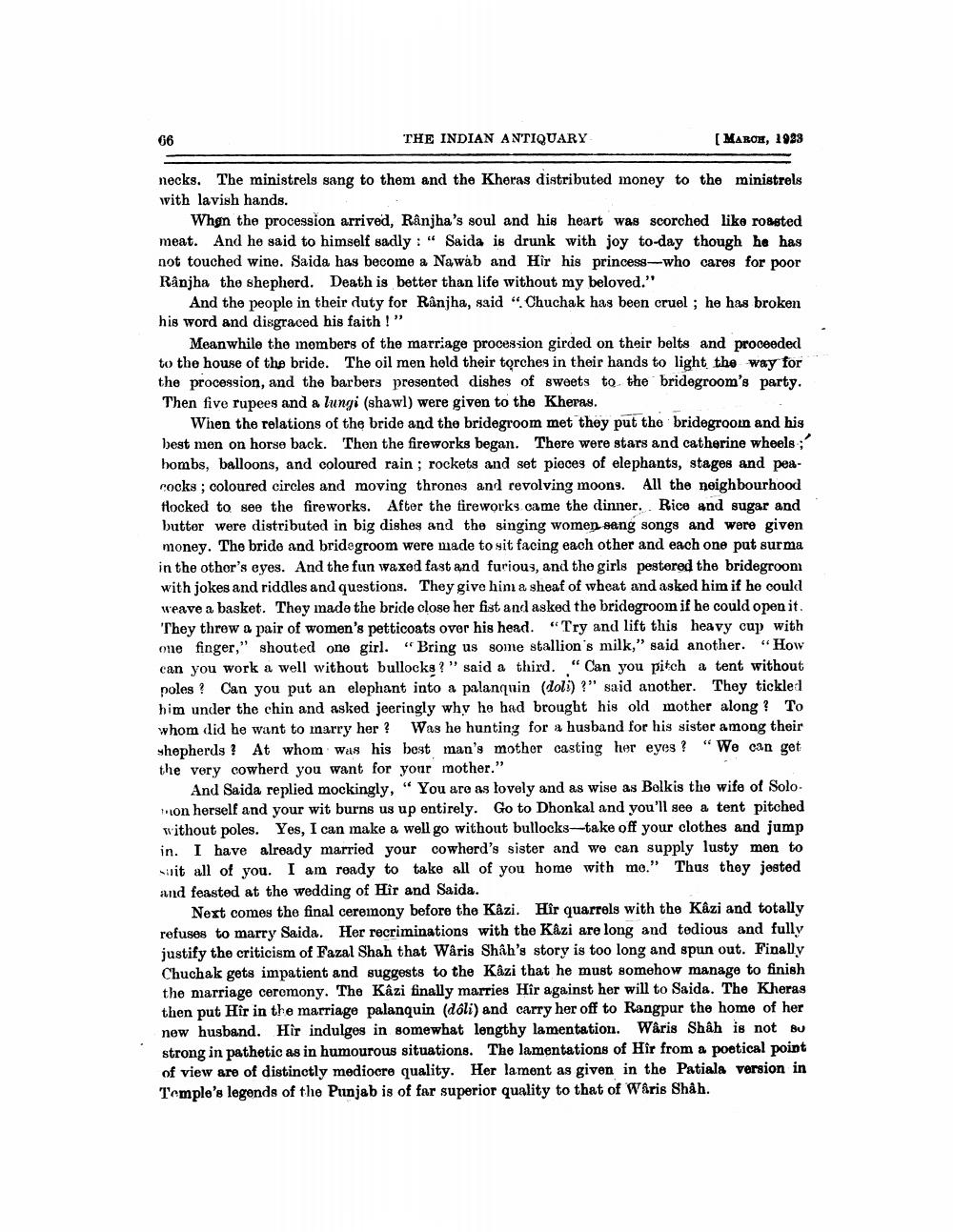________________
66
THE INDIAN ANTIQUARY
[MARCH, 1923
necks. The ministrels sang to them and the Kheras distributed money to the ministrels with lavish hands.
Whøn the procession arrived, Ranjha's soul and his heart was scorched like roasted meat. And he said to himself sadly: "Saida is drunk with joy to-day though he has not touched wine. Saida has become a Nawab and Hîr his princess-who cares for poor Ranjha the shepherd. Death is better than life without my beloved."
And the people in their duty for Ranjha, said " Chuchak has been cruel; he has broken his word and disgraced his faith!”
Meanwhile the members of the marriage procession girded on their belts and proceeded to the house of the bride. The oil men held their torches in their hands to light the way for the procession, and the barbers presented dishes of sweets to the bridegroom's party. Then five rupees and a lungi (shawl) were given to the Kheras.
When the relations of the bride and the bridegroom met they put the bridegroom and his best men on horse back. Then the fireworks began. There were stars and catherine wheels;' hombs, balloons, and coloured rain; rockets and set pieces of elephants, stages and peacocks; coloured circles and moving thrones and revolving moons. All the neighbourhood tlocked to see the fireworks. After the fireworks came the dinner. Rice and sugar and butter were distributed in big dishes and the singing women seng songs and were given money. The bride and bridegroom were made to sit facing each other and each one put surma in the other's eyes. And the fun waxed fast and furious, and the girls pestered the bridegroom with jokes and riddles and questions. They give him a sheaf of wheat and asked him if he could weave a basket. They made the bride close her fist and asked the bridegroom if he could open it.
They threw a pair of women's petticoats over his head. "Try and lift this heavy cup with one finger," shouted one girl. “Bring us some stallion's milk," said another. "How can you work a well without bullocks?" said a third. "Can you pitch a tent without poles ? Can you put an elephant into a palanquin (doli) ?" said another. They tickled him under the chin and asked jeeringly why he had brought his old mother along? To whom did he want to marry her? Was he hunting for a husband for his sister among their yhepherds ? At whom was his best man's mother casting her eyes ? "We can get the very cowherd you want for your mother."
And Saida replied mockingly, “You are as lovely and as wise as Bolkis the wife of Solo rion herself and your wit burns us up entirely. Go to Dhonkal and you'll see a tent pitched without poles. Yes, I can make a well go without bullocks-take off your clothes and jump in. I have already married your cowherd's sister and we can supply lusty men to
it all of you. I am ready to take all of you home with me." Thus they jested and feasted at the wedding of Hir and Saida.
Next comes the final ceremony before the Kâzi. Hîr quarrels with the Kâzi and totally refuses to marry Saida. Her recriminations with the Kazi are long and tedious and fully justify the criticism of Fazal Shah that Waris Shah's story is too long and spun out. Finally Chuchak gets impatient and suggests to the Kazi that he must somehow manage to finish the marriage ceremony. The Kâzi finally marries Hîr against her will to Saida. The Kheras then put Hîr in the marriage palanquin (doli) and carry her off to Rangpur the home of her new husband. Hîr indulges in somewhat lengthy lamentation. Waris Shah is not BU strong in pathetic as in humourous situations. The lamentations of Hir from a poetical point of view are of distinctly mediocre quality. Her lament as given in the Patiala version in Temple's legends of the Punjab is of far superior quality to that of Waris Shah.




